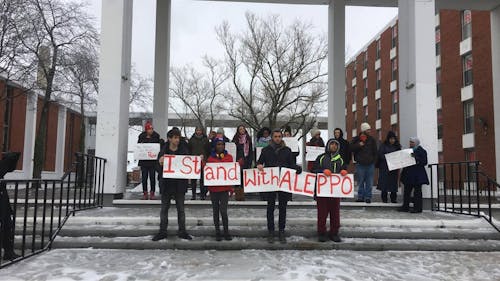Rutgers students protest rising death count in Syria

With the first snow on the ground, a small group of protesters gathered Saturday on the steps of the Brower Dining Commons to protest human rights violations in the Syrian city of Aleppo.
Meenal Paul, a School of Arts and Sciences junior organized the rally to raise awareness of the airstrikes in the country, backed by the Russian government and Syrian regime, which since March 2011 have killed more than 400,000 people according to United Nation estimates.
She said she was inspired by a series of goodbye letters posted by Syrian citizens on social media. In one such letter, a man wrote, “I don’t have faith in the international community anymore.”
“It felt like they were personally calling me out,” she said. “Like they were talking to me directly and I felt guilt and shame and anger - and I think everybody should feel that. Everybody should feel their blood boil and everyone should feel called out.”
Within a few days of Paul creating the event on Facebook, more than 200 students had RSVP’d to join the protest and an additional 500 expressed interest. These numbers were in stark contrast to the actual event turnout, she said, which fluctuated between 15 and 20 students over the two hour period.
“I repeat myself when I say time is of essence in Aleppo,” Paul said, “The difference between a B+ and an A is not worth a life. The fact that you are going to be cold for 40 minutes or an hour is not worth a life, because there are people in similar conditions in snow, living in tents in refugee camps right now.”
Developments in Aleppo have continued to deteriorate over the last few days. Regime forces reportedly executed more than 82 civilians in a single incident earlier this week, according to National Public Radio. Among the dead were 11 women and 13 children.
In a press briefing, a spokesperson for the United Nations said there are still thousands of civilians residing in at-risk neighborhoods in the city.
“We received further deeply disturbing reports that numerous bodies were lying in the street but residents were unable to retrieve them due to the intense bombardment, and their fear of being shot on site,” The High Commissioner for Human Rights wrote in the briefing.
Just because this is not happening in close proximity to Rutgers does not mean it is not happening, said Hanin Sukayri, a School of Arts and Sciences senior.
“Obviously the turnout isn’t that big, but holding up these posters and having people throw out that message is really crucial,” Sukayri said, “You see videos on Facebook but it’s so easy to just scroll past them, whereas with the posters and the protest, it is very present. It is happening right now.”
Sukayri said he was motivated to participate in the rally by recent reports of civilians committing suicide in the city.
Last week, the New York Times reported 20 Syrian women in Aleppo took their own lives out of fear that they would be captured, tortured or raped by Assad’s troops.
“I understand that the conditions are terrible. It’s snowing, everyone has finals, but taking away one hour of time you’d otherwise use to procrastinate on Netflix, it is so much better to use it for a worthy cause,” Sukayri said. “These children - the only thing they did was be born in Aleppo.”
The students stood in silence with their signs from 11 a.m. to 1 p.m. Most passers-by gave the protesters passing glances, but some stopped to stand with the group. One offered to hold up the edge of a large banner with the phrase “I Stand With Aleppo” written across it.
Asked how Rutgers students have responded to the situation in Aleppo, Dials Ghneim said, “they haven’t.”
“This is not political anymore,” the School of Arts and Science senior said. “It is not about who is doing what. There are a lot of people who are dying right now and I wish more people would come out and that more people would care.”
When people say “never again,” after a genocide or human rights tragedy, Ghneim said it is important that people do not isolate that sentiment to only a certain group of people or to a certain situation.
Paul said that throughout history, similar hypocrisy has always surrounded the question “how did this happen?”
“Growing up, you learn history and you ask how these tragedies occur, and we are letting one happen right now. By not saying anything, we are letting a genocide happen. We are going to look back in history and people are going to question us,” she said.
Paul said it is easy to feel overwhelmed by such a drastic human rights crisis, but students can still make a difference by spreading dialogue and donating to relief organizations such as the Red Cross or the White Helmets.
“There are people hugging their dead children right now, their dead parents and they’re hopeless,” she said. “We are their hope, but we are doing nothing.”
Kira Herzog is a School of Arts and Sciences sophomore majoring in political science and journalism and media studies. She is a correspondent for The Daily Targum. Follow her on Twitter @kiraherzog1 for more.



